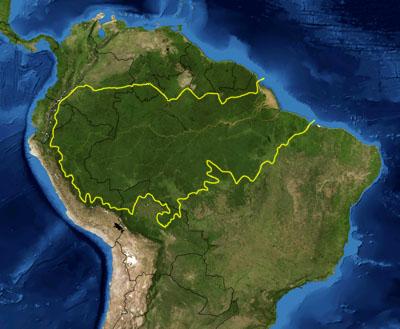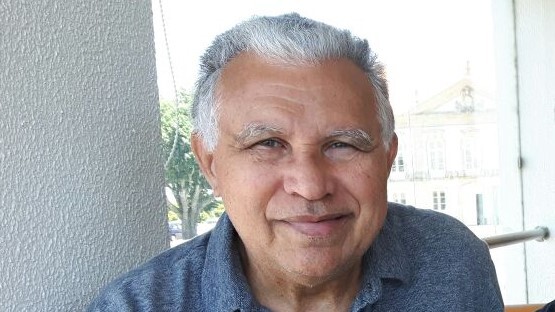Sean McShee and Manny Tejeda-Moreno contributed to this article.
MIAMI – The COVID-19 pandemic is an ongoing challenge for everyone but it poses a specific and serious threat to the isolated, Indigenous peoples of Brazil where the disease is spreading rapidly.

Amazon rainforest – The yellow line encloses Amazon Basin as delineated by the World Wide Fund for Nature. Image credit: NASA,, Public Domain, Modified by Pfly
Early in the pandemic, the National Indian Foundation of Brazil (Fundação Nacional do Índio: FUNAI) ordered all civilians out of all Indigenous areas. Only essential workers, like health care workers, could stay. On July 7, Brazilian President Jair Bolsonaro granted an exception to that order. Under that exception, Christian missionaries could enter Indigenous areas. Those missionaries just need a note from a doctor saying they were healthy.
Many Pagans have been outraged by the proclamation. Rev. Rayna Templebee, a Pagan and an anthropologist, gave voice to the anger. “Ignorant white missionaries from the US with a god complex” are destroying indigenous, earth-based religions. She noted that while they may think they are doing “good,” they are “stealing someone’s gods and replacing them” with their own.
Templebee described that as evil. She continued, “What we see in this new Brazilian legislation is fundamentalism at its worst – the use of state power to strip indigenous populations of their culture.” People without their culture have less power to defend their land.
Templebee’s anthropological and archaeological work is in Mexico and she has witnessed the same behavior there with Indigenous communities. Templebee has seen evangelicals converting people. She said, “Throughout Latin America, … evangelicals arrive uninvited, with free clothes, toys, and medicine that they ‘give’ to the impoverished local population in exchange for conversion.” People know they are being manipulated, but they need resources. She continued, they “will go through the motions of conversion … some people [will] end up true believers.”
Dr. Saulo Baptista, a Brazilian and expert on North American fundamentalist evangelicals in Brazil agrees. He holds a doctorate in Religious Sciences and a Masters in Sociology and has studied the evangelical politics in Brazil, and the North American export of fundamentalist beliefs.

Dr. Saulo Baptista – courtesy
Baptista noted that, “Until the 1970s, an evangelical was equivalent to a Protestant. However, with the significant growth of Pentecostalism and neo-Pentecostalism, in the following decades, this term began to serve as an umbrella to encompass both these new and old actors, belonging to missionary and migratory Protestantism.” He noted the rise in missionary behaviors and the rise in fundamentalism and the focus on conversion over mere assistance.
Baptista distinguishes between Evangelicals, Pentecostals, and neo-Pentecostals. Currently, about 70 million (33%) of Brazil’s 211 million people, identify as Evangelicals. Roughly, 50 million of those evangelicals identify as Pentecostals or neo-Pentecostals.
These “neo-Pentecostals” as Baptista notes have a twofold objective, “the first lies in the so-called ‘spiritual battle’, that represents, permanent belligerence against demonic beings, who, according to this doctrine, are responsible for all the evils that afflict humanity; and the second is the ‘theology of prosperity’, based on divine redistribution; That is to say, everything that the faithful donate to the church, they will be donating it to God, and he will reward it in a multiplied way, in blessings of all kinds, such as health, professional success, structured family, freedom from addictions, fame, in short, prosperity, in all dimensions of life.”
That representation of abundance and gifts is consistent with prosperity theology, a religious belief among some Protestant Christians that financial blessings are the will of God and given to the faithful for their devotion. There have been prominent proponents of Christian prosperity theology in the USA including influential pastors in the pentecostal and charismatic movements such as Rev. Joel Osteen, Rev. Oral Roberts, and Rev. Robert Tilton.
Prosperity theology greatly diverges from Christian social teaching that centers upon ministering to the needs of the poor and disenfranchised. Catholicism, in particular, considers prosperity theology as a distortion of Christianity.
Those social teachings have not guided the Bolsonaro government’s response to COVID-19, however. Last February, Bolsonaro placed an evangelical pastor, Ricardo Lopes Dias in a position of power. He was appointed head of the FUNAI’s Uncontacted Indians’ Unit of FUNAI.
Previously, Lopes Dias had worked with the Brazilian New Tribes Mission. That group has since changed its name to Ethos360.
It states as one of its core beliefs: “It is the church’s responsibility to glorify Christ by preaching the gospel to the world and making disciples of all nations.”
They claim to have 3,000 missionaries throughout the world.
Bolsonaro’s government has promised that it will contract 5,811 other doctors to work in rural areas. But those workers have not yet materialized rural Brazil is now facing a global pandemic with a much diminished public health workforce.
Last month estimates suggest that some 30,000 Indigenous people had been infected with the novel coronavirus that causes COVID-19. At the beginning of the summer, FUNAI had spent only about 18% of its allocated funds to protect Indigenous communities. Indigenous communities had not received masks or other protective equipment let alone medicines. Moreover, health care workers were also inadvertently spreading the virus deeper into the Amazon.
That area includes the Javari Valley Indigenous Territory that contains the largest number of non-contact Indigenous groups in the world. It extends over 8.5 million hectares (32,818 square miles). Twenty-six indigenous groups live in this area. Sixteen of which have chosen to reject contact.
Templebee pointed out that these non-contact groups “are intentionally isolated populations. They aren’t living in a time bubble or unaware of the rest of the world. They send representatives to the capital for governmental meetings, etc. They choose to live in as isolated a way as possible for cultural reasons.” Their current choice to become non-contact groups is but one in a long line of choices to defend their cultures and lives.
Indeed, since 1988, Brazil has adopted a policy of leaving the non-contacted peoples in peace. But no coronavirus protection plan for these communities has come forward from the Bolsonaro government.

Amazon river in Brazil -Image credit: Alexander Gerst – Flickr, CC BY-SA 2.0
Baptista is not surprised. “The overwhelming majority of Brazilian evangelicals are only interested in messages and practices that lead to spiritual salvation.” He added “Neo-Pentecostals follow the theology of spiritual battle and prosperity (ideas imported from the United States). There is no interest in solving environmental problems.” Baptista noted that these evangelicals lack any concern for nature. Their only interest is winning souls.
Furthermore, Brazilian law infantilizes Indigenous communities robbing them of their agency and enabling the missionaries. Baptista explained that Brazilian law defines Indigenous people as unemancipated. They are seen as “eternal minors,” relying on the paternalistic “protection” of the state.
Baptista argues that this view of Indigenous communities and Bolsonaro’s ideological echos to Brazil’s former military dictatorship of the 1960s and 70s that instigated policies to force all Brazilians to assimilate to Western monoculture. The ideological descendant of the military dictatorship forms one of Bolsonaro’s political bases and that dictatorship rejected the idea of a multi-ethnic society.
Baptista argues that Bolsonaro is continuing that rejection and it drove his decision to allow missionaries to enter non-contact areas.
There is hope, however. Indigenous communities have fought back. Last month Kayapó warriors blocked highway access to the Amazonia state of Pará. Brazilian officials have also delivered food and hygiene supplies.
Meanwhile, deep in the northwest Amazon in the Alto Rio Guama Indigenous Territory, the Tembé shut their doors to the outside world and allowed people in only during emergencies. They are celebrating 6 months without a single case of COVID-19.
The Wild Hunt is not responsible for links to external content.
To join a conversation on this post:
Visit our The Wild Hunt subreddit! Point your favorite browser to https://www.reddit.com/r/The_Wild_Hunt_News/, then click “JOIN”. Make sure to click the bell, too, to be notified of new articles posted to our subreddit.